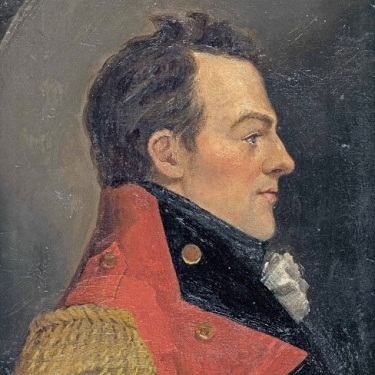Wary of the growing hostility between Britain and the United States, and a keen judge of his own men’s strengths and vulnerabilities, British commander Isaac Brock took vigorous measures to prepare Canada against the expected American invasion.
“The American government is determined to involve the two countries in a war” General Isaac Brock

Alice Kerr-Nelson, 1881. Copy of painting by Gerrit Schipper (c.1808).
From the moment Lieutenant-Colonel Isaac Brock arrived in British North America in 1802, he worked tirelessly to rebuild the defenses, accommodations, morale, and discipline of the troops in Canada. A capable commander, Brock improved fortifications at Quebec and along the frontier and moved soldiers to healthier quarters in the capital, York, near modern-day Toronto. Brock also improved the living conditions for troops in the hopes of stemming the tide of deserters who had left the army in search of free land and new opportunities.
But Brock was no soft touch. He also tightened discipline in the ranks, putting down a mutinous plot at Fort George, and ruthlessly pursued deserters. His actions left him with a reputation as a shrewd and effective military leader.
Brock also paid close attention to the mounting animosity between the United States and Britain. Many of his contemporaries viewed the escalating exchanges as mere bluster, unlikely to lead to open war. But Brock viewed events as more ominous. After a confrontation between the British ship HMS Leopard and the USS Chesapeake in 1807, Brock described a rupture between the two nations as probable. The following year, he wrote his brother that he was “convinced that the American government is determined to involve the two countries in a war.”And in early in 1811, Brock further demonstrated his grasp of the U.S. political pulse in another letter to his brother: “The president’s address is sufficiently hostile,” he wrote, “And if I thought that he would be supported to the extent of his wishes, I should consider war to be inevitable. Congress will hesitate before consenting to go the length he proposes.”
Brock was careful to avoid any excuse for conflict along the Niagara border. But his insights proved prophetic as President James Madison and his supporters convinced Congress in June 1812 to declare war on Britain.
As American ground forces would discover early on at Fort Detroit, the relentless leadership, determination, and planning of one charismatic and single-minded commander could prove decisive. Brock’s leadership strengthened both the capacity and the resolve of British and Canadian troops during the conflict.
Last updated: May 24, 2016
